Wadda Moolie!
Meet Genavie, Natalie, and Joanne, members of the Aboriginal and/or Torres Strait Islander Health Worker and Health Practitioner workforce who currently work with the Torres and Cape Hospital and Health Service (TCHHS) Midwifery Navigation Service. This service supports women who travel to Cairns from the Torres Strait, Northern Peninsula Area and Cape York to access specialist obstetric and maternity services.
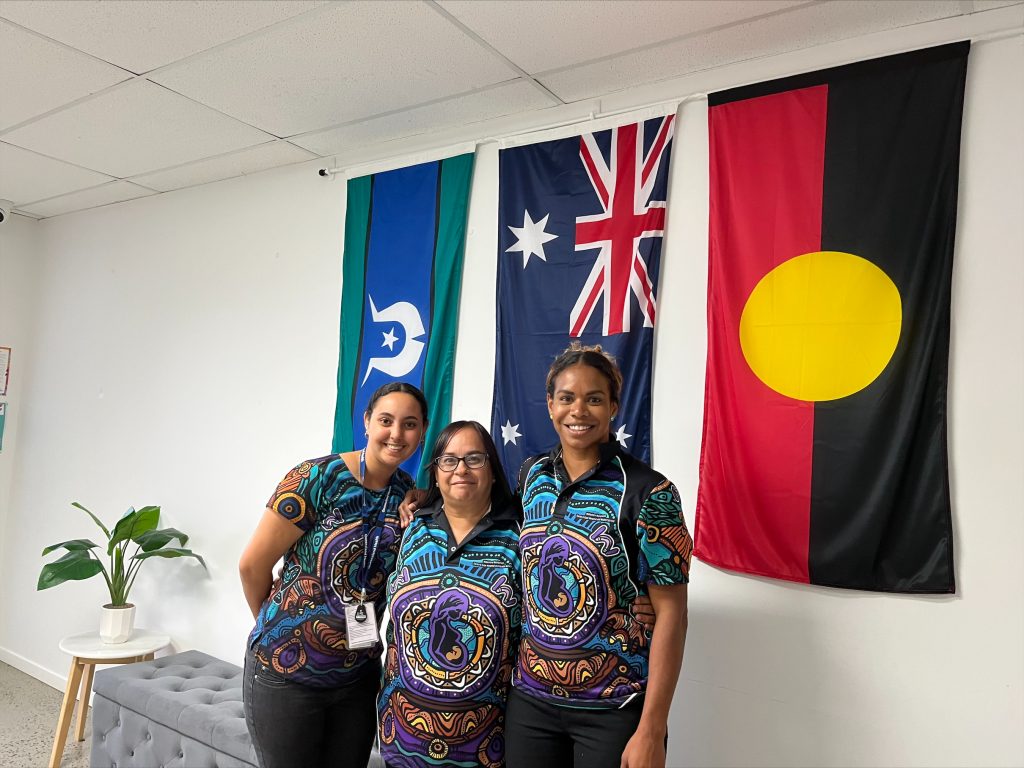
L-R: Joanne Taylor, Natalie Thaiday and Genavie Tabuai of the Torres and Cape Hospital and Health Service (TCHHS) Midwifery Navigation Service.
Genavie Tabuai (née Sambo) was born and raised on Gimuy (Cairns) and has cultural connections to Daly River in the Northern Territory and the Eastern and Central Islands of the Torres Straits – Meuram clan of Mer (Murray Island) and Masig (Yorke Island) of the Kulkalgal nation. She has a Diploma of Aboriginal and Torres Strait Islander Primary Health Care and is currently working as an Advanced Health Worker.
Joanne Taylor grew up in Cooktown on the beautiful land of the Yuku Baja-Muliku, Kuku Bididji and Kuku Nyungkul clans. Her mum is from Murray Island (Mer), part of the Eastern cluster of the Torres Straits, and her clan is the Komet tribe. Her mum’s great grandmother was part of the stolen generation, believed to be moved from Frazer Island to Yarrabah. She holds a Certificate III in Health Service Assistance, Certificate III in Community Services, Certificate IV in Aboriginal and Torres Strait Islander Primary Health Care (Community) and is currently enrolling into the Certificate IV in Aboriginal and Torres Strait Islander Primary Health Care (Practice), and is employed as a Trainee Health Worker.
Natalie Thaiday (née Nicol and Hodges clans) is a proud Juru woman with family kinships connected to Gregory Downs, Burketown, Bowen, royal nobility to Tudu and Gebar Island in the Torres Straits and families from stolen generation survivors. She has a Diploma in Enrolled Nursing, Certificate IV in Aboriginal and/or Torres Strait Islander – Primary Healthcare Community, Certificate IV in Aboriginal and/or Torres Strait Islander – Primary Healthcare Practice and a Diploma in Aboriginal and/or Torres Strait Islander Primary Health Care. Natalie is currently working as a Health Worker.
Aboriginal and/or Torres Strait Islander Health Workers and Health Practitioners are the world’s only culturally-based health professions underpinned by national training and regulation. Within Aboriginal and Torres Strait Islander communities, this workforce is renowned as a vital and reliable community resource with evidence directly connecting them to improved health and wellbeing outcomes in their communities. Yet, across mainstream Australia, few recognise them as standalone professions or that they are trained with clinical skills to work in primary health care. Subsequently, they continue to be under-supported, under-recognised and under-utilised.
Genavie, Natalie and Joanne work within a multidisciplinary team of Midwifery Navigators, in partnership with the individual women and their Midwifery Group Practice Midwife. They support and advocate for a collaborative approach that enables women-centred maternity care, whilst integrating clinical care with traditional and cultural practices. Establishing and strengthening formal partnerships with external service providers is critical to facilitate positive outcomes for their patients.
Although there is no standard day in their roles, a typical day might entail reviewing and triaging referrals, providing continuity of care to pregnant women prior to arriving, during their stay in Cairns, and on their return to community. This includes making contact through telehealth or video before arrival, to introduce the team and assist with any logistics for travel or appointments. When the women arrive in Cairns, either for a few appointments or for an extended stay prior to birth, they are warmly greeted by the familiar faces of Genavie, Natalie and Joanne.
They assist their patients by acting as cultural navigators of the health system and partnering with other services to provide transport, coordinate patient travel bookings, organising appointments at hospital or through other external providers such as radiology or pathology services. Additional support is sometimes needed, particularly for high-risk pregnant women who require specialist appointments, scans or confinement. No matter what support is required, they consistently go above and beyond to support women and their families by providing orientation to the town and facilitating access to food, schooling, pharmacy, accommodation and anything else they may need. They do home visits at their accommodation to check in on the condition of the women and their families, assess whether accommodation or housing is appropriate and advocate and support any moves when necessary.
Additionally, a key component of their roles involves health promotion and education, early detection and prevention, and health coaching. They address many of the cultural and social determinants to improve health outcomes for women and their families. Some of the focus areas include, but are not limited to, healthy lifestyle, smoking cessation, alcohol and other drugs, sexual health education, prevention and management of chronic conditions, social and emotional wellbeing, perinatal mental health, domestic and family violence, housing and empowering women to self-manage. They also provide antenatal support; assessing fetal growth and baby movements, birthing support; attending appointments, patient advocacy and postnatal support; safe sleeping, breastfeeding and postnatal health checks.
“Growing up, I always questioned why so many First Nations people were passing away from preventable diseases at a younger age-range compared to non-Indigenous people. This always triggered me and became one of the main reasons I joined the health force. To ensure that my people weren’t constantly falling through the cracks of the system, I made it my goal to study and learn about the human body and then share that knowledge with everyone, with the hope to encourage them to improve their health and take proper control of their care in an effective way” says Joanne Taylor.
Their cultural knowledge, skills and life experiences allow Genavie, Natalie and Joanne to provide cultural, social and emotional wellbeing support to women and their families. This is an important consideration for those who are travelling away from Country and family. Having cultural knowledge allows them to provide and care through a holistic approach, providing and advocating for culturally safe care and promoting social and emotional wellbeing which can be critical for some women who are birthing away and off Country. They often need to address racism and advocate for appropriate care, follow up, access, cultural needs and practices and child protection supports. They take an active approach in community health clinics by communicating and encouraging transparency around child alerts and concerns. Having family and community knowledge, the workforce plays a vital role in providing advice and support to other staff and health professionals who may not be familiar with the community.
Although they facilitate positive health and wellbeing outcomes for their communities, the workforce consistently faces many unnecessary challenges and barriers. Firstly, they are under-valued and under-utilised while their scopes of practice don’t reflect their qualification and skills. They experience a lack of professional development opportunities to progress their careers, and inequality between salary and work levels. They are also met with challenges in the systems they are working in, with inadequate support services prior to their patients’ initial referrals and a lack of facilities, programs and access for women in their communities when they return home. They encounter racism on a regular basis which they need to navigate for their patients whilst also looking after their own wellbeing and cultural needs. It is critical for improvements in human resources to address racism and cultural safety training and practices.
Genavie Tabuai says her motivation is “giving back to my people and community. We as First Nations peoples are disadvantaged in every aspect of life and continue to fight and struggle for adequate opportunities to healthcare, with prolonged chronic conditions due to historic events (colonisation).”
As with most or even perhaps all members of this workforce, Genavie, Natalie and Joanne continue to overcome adversity and work in their roles because they are passionate about improving health and wellbeing outcomes for their mob. They know it is critical to address Indigenous health inequality, and how important it is to support and empower their communities to take their health into their own hands. They want to advocate and support their communities to access enhanced health care, provide education in social, emotional and clinical aspects, and continue as cultural navigators of health systems that are not designed for their mob and their holistic views of health.
They love giving back to their people and find it a privilege to walk beside and care for women that are carrying future generations, and future elders. They are breaking down cycles of intergenerational trauma and reducing the severity of chronic conditions for the next generations. Knowing that they’re making a difference by ensuring their communities feel safe and secure is what really matters. Fronting the many challenges gives them the drive to continue their important work and ensure that issues are addressed and prevented for others.
Natalie Thaiday explains, “I love what I do. It is more than a job; it is my passion. As an educated woman I want to continue to encourage, support and advocate for my people so they can take back ownership of their health and health outcomes.”
For more information on the important work of Health Workers, visit www.NAATSIHWP.org.au.
Special thanks to the National Association of Aboriginal and Torres Strait Islander health Workers and Practitioners (NAATSIHWP) for assisting with this article.
Our feature articles represent the views of our authors and do not necessarily represent the views of the Royal Australian and New Zealand College of Obstetricians and Gynaecologists (RANZCOG), who publish O&G Magazine. While we make every effort to ensure that the information we share is accurate, we welcome any comments, suggestions or correction of errors in our comments section below, or by emailing the editor at [email protected]. Those pictured have provided consent for their name and image to be included.


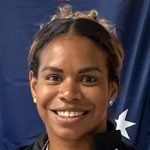
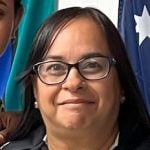
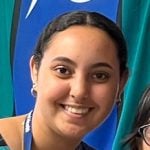

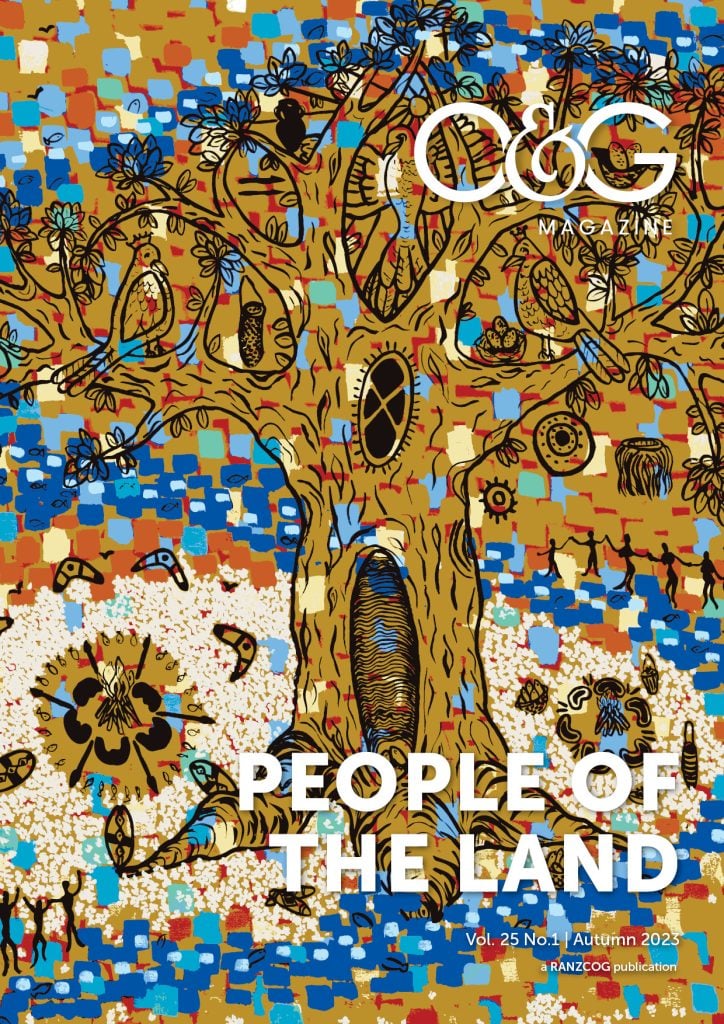
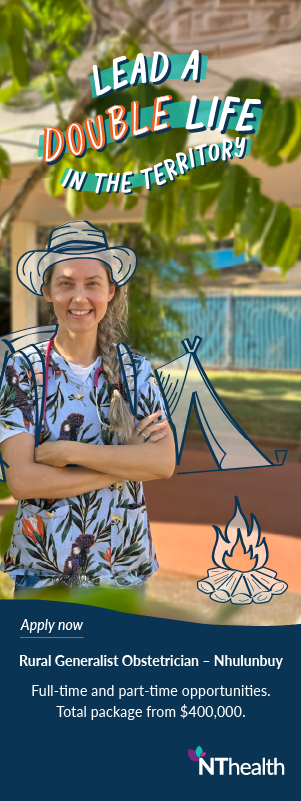

Leave a Reply